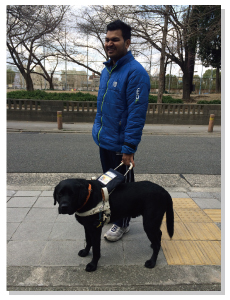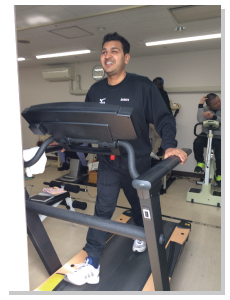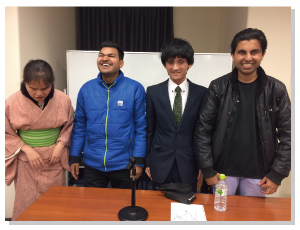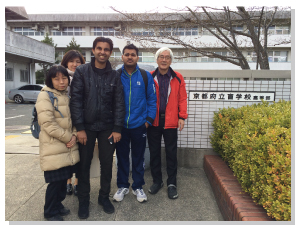- HOME
- Alumni News
- Ramdas Shivhare (participated in the 18th Program)
- Ramdas's Final Report
Ramdas's Final Report
Final Report
Introduction
Duskin leadership program is designed for persons with disabilities, and as I intended to make an effective intervention and improve the lives and dignity of persons with disabilities, especially the visually challenged, I was interested in participating in this unique program. I was sure it would strengthen my capacity to provide a better leadership to protect the rights of persons with disabilities.

Japanese language classes
Before arriving in Japan, I had never had a chance to learn the Japanese language and was not able to speak a word of Japanese. It is believed that Japanese is one of the most difficult languages in the world. Learning it as my third language was not easy. Initially it was very difficult to communicate with Japanese people, but gradually my Japanese got better. I also learned Japanese Braille which was not just scientific but very easy to learn for beginners. I already knew all the signs/ dimensions of the dots used in Hindi and English Braille. Since, Braille is based on six dots and with these six dots, sixty-three characters can be formed. With these six dots and sixty-three characters one can read and write any language in the world. Of course, while learning Japanese Braille I saw some signs commonly used in Hindi, English and Japanese Braille. Therefore, gradually I became comfortable with Japanese Braille too. I was very impressed with the teachers’ excellent teaching methods.
From Individual Training comes learning
After the intensive Japanese language lessons, all of us trainees were separated, according to our learning interest. Individual training was a very important part of the program which allowed us to pursue interests in which we wanted to excel. As for me, I visited a wide range of public institutions, rehabilitation centers, special schools, inclusive schools, student support centers in universities and libraries, national and regional institutions of the government, and NGOs and NPOs across Japan working for the amelioration of the plight of persons with disabilities in Japan. Of course, the program also facilitated my specific interest which was to study the functioning of public institutions in Japan. In the beginning, it was really a big challenge for me because my Japanese was still not quite good for communication and absorbing knowledge but gradually I began to see great improvements. I would like to mention some places where I learned a lot about persons with disabilities.



Nippon Lighthouse-Osaka, Japan
I had an opportunity to join the Nippon Lighthouse for about one month to study different kinds of activities and understand Japanese culture and its approach/social attitude/practice towards disabilities and inclusion of the disabled people in the mainstream Japanese society. I was also interested in visiting places provided under Japanese laws and in its legal framework with specific focus on persons with visual disabilities. The Nippon Lighthouse, established in 1922, is a pioneer agency in Japan, which has been continuously striving to improve the lives of the persons with visual disabilities. They offer many services including information accessibility, rehabilitation of visually impaired persons, training and assistive services for independent living, special needs and inclusive education, vocational training and sheltered workshop, electronic and Braille library along with a Technical Center of Tactual Information. I tried my best to participate actively in all these activities and received both theoretical knowledge and practical experiences of these services.
At Nippon Lighthouse, I received theoretical knowledge and practical experiences related to welfare policies and its implementation. In addition to the list above, this included disability movement, volunteer system and employment, leisure and recreational activities for persons with disabilities. I visited rehabilitation centers and student support centers in universities, libraries in Osaka and Kyoto. I also had an opportunity to meet experts and had very healthy and fruitful academic discussions about these issues. I also visited some universities and got a chance to learn about social welfare systems, national laws and legislations for persons with disabilities. I also tried to understand their implementations and practice in different prefectures. Japan has 47 prefectures and every prefecture has their own social welfare policy and its implementation.
Independent Living
India is the seventh largest country and one of the fastest growing economies of the world. India also has the second largest population, most of it youth. According to the 2011 census, India has around 27 million disabled people but according to other non-governmental agencies the numbers are much higher, more than 40 million and most of them live in the countryside/villages or neglected districts. They mostly come from very poor financial backgrounds, deprived of good education. Although the number of persons with disabilities going to higher education is very low, certain laws such as Rights for Persons with Disability Act 1995 and a recently passed legislation called Rights for Persons with Disabilities (RPD bill) made education viable for persons with disabilities. People with disabilities subsequently go for jobs in private and public sectors thus securing their social status and acceptance. On the other hand, disability is a marginalized sector and is understood as poorest of the poor in the country. Given these circumstances, the idea of independent living still has a long way to go.
Currently, there are more than 120 independent living centers (CIL) in Japan. I was motivated to work hard to experience and learn about independent living (IL) in Japan. The important concept of IL is to make people with disabilities strong enough to make their own choices and decisions, and take responsibility for the choices made. However, in most developing countries around the world, it is still believed people with disabilities need to live with their families even if they get older. On top of that, they are facing several kinds of discrimination in day to day life. In society people still have many superstitions, negative beliefs regarding disability and related issues. Generally, developing countries do not have any government pensions, barrier-free infrastructure, helper system or personal assistant services. Despite all this, I believe people with disabilities in India will be able to live independently in near future. I visited several CILs in Japan. They shared the same goals, but activities were different from center to center. It made me hopeful realizing that we could establish our own CIL in India, suited to needs of people with disabilities.
Peer Counseling
Before coming to Japan, I had never heard of counseling and the idea of peer counseling was totally new to me. I learnt about it at CIL ‘Human care Association’ and ‘Step Edogawa’, tailored to each person with different disabilities, such as intellectual or severe disabilities. I think peer counseling is very important for empowering people with disabilities. There are three main objectives: Recovering self-trust, reconstructing relationships and changing society. During peer counseling sessions, we are supposed to focus strongly focus on some important points that constitute our sense of well-being. For instance, we want to love, and be loved, we are very creative, very intelligent, full of joy, strong and powerful, etc.
The peer counseling specialist told me about social model of disability at the CIL. In medical models, people with disabilities are told by specialists to work hard on rehabilitation and strive to become healthy like people without disabilities. But this is not so easy, so people with disabilities begin to lose confidence. In peer counseling, we do not need these medical models. We share our experience which helps us understand each other’s feelings, and give and be given support. It is the first step towards a social model.
Sign Language
As far as I know there are very few sign language interpreters in India which not only makes it difficult for persons with hearing impairment but almost next to impossible for people with different disabilities to gather and work together. Therefore, I was encouraged to learn the basics of sign language in this program. I believe it will help me a lot to have a better understanding about disabilities and related issues. Probably, it would also be helpful to establish a cross-disability forum and make it easier to organize activities or provide a shared platform for all.
Inclusive society
Discussion of barrier-free/inclusive society is very difficult and complicated. Now we are living in the 21st century in the era of science and technology. At the end of the 20th century it was recognized that persons with disabilities are also entitled to equal rights and participation in mainstream society. During this period, there were several international activities and initiatives which were helpful to cast spotlight on persons with disabilities. Various domestic laws enacted by different countries opened the door to start discussion about the equal rights, opportunities, and participation of persons with disabilities in mainstream society. It also included discussion of barrier-free environment and inclusive society.
Right now most countries still fall far behind barrier-free or inclusive society but having never seen a completely barrier-free environment, it is not easy for anyone to get a clear picture or barrier-free environment for all. We assume barrier-free environment for all may be this and that but it is merely an image inspired by someone else. It doesn’t mean that we should not go beyond the current perception and work hard to achieve more.
We have barrier-free transport, buildings, infrastructure, public places, and movement of the people with disabilities and so on as we know them, accessible by the present world standard but who knows if they will remain the same going forward? Nothing is permanent. Most of places in Japan are highly accessible for persons with disabilities. Persons with disabilities can go anywhere, using barrier-free transportation. For instance, accessible pathways, gratings and tactile markings on the road, curbs, ramps, power-operated doors, announcements in trains and stations, and assistant services in trains. Most places have accessibility features as per the guidelines.
Although Japan is one of the most accessible countries in the world for people with disabilities, Japanese society is still very far from Ideal inclusiveness. There are enough examples of exclusions or segregations which can be seen everywhere. Especially in employment, persons with disabilities are far from equal treatment. There are few persons with disabilities who are really working in mainstream public or private organizations. This difference is clearly visible. For instance, persons with visual disabilities are still basically engaged in their traditional occupations such as, acupuncture, massage, moxibustion etc. Employers do not wish to recruit visually challenged people. In Japanese law there are no guidelines or rules about employing a certain percentage of people with specific disabilities.
Future goals
In India, awareness is growing in society on disability issues, but much needs to be done to make society truly inclusive and caring. I have learnt much through my own experience, as a child from a backward rural area, getting the benefits of education and working my way up to find a respectable place in mainstream society, working as a manager in a reputed bank. In my student days, I was conscious of the limitations posed by society’s ignorance, including the lack of progressive legislative frameworks and affirmative actions to make society more inclusive, respecting the rights and dignity of persons with disabilities. Everything I gained from Duskin Leadership Training will empower me further to work more effectively not only among persons with disabilities but equally in general society towards ensuring dignity and equal rights for persons with disabilities. I have been actively associated with both advocacy and service organizations of and for persons with disabilities, particularly, the visually challenged. I shall strive to contribute with greater vigor and commitment to the cause of persons with disability through these organizations. In addition, I would also like work to promote closer interactions between India and Japan in the disability sector.
Gratitude
I would like to express my heartfelt gratitude to the Duskin Ainowa Foundation and all the staff of JSRPD who were always thinking about our needs, and all other concerned organizations, for their great efforts to make my learnings in Japan a successful and meaningful experience. By the end of this program I have not only gained and learnt so many things but also understood the Japanese culture and its approaches/social attitudes/practices towards disabilities and inclusion of disabled people in mainstream Japanese society.
Japanese people are very sincere, disciplined about their work and duties, punctual, caring, hard-working, peaceful, and kind. The knowledge and the experience I got here made me confident, energetic and more committed to work for disability movement.
The Duskin program is a good opportunity to understand cross disability issues. The 10 months I spent in Japan are an unforgettable time for me. Duskin provided me with a good opportunity to see a real life.
Last but not the least I would like to express my heartfelt gratitude to those who indirectly helped to make this program successful.




